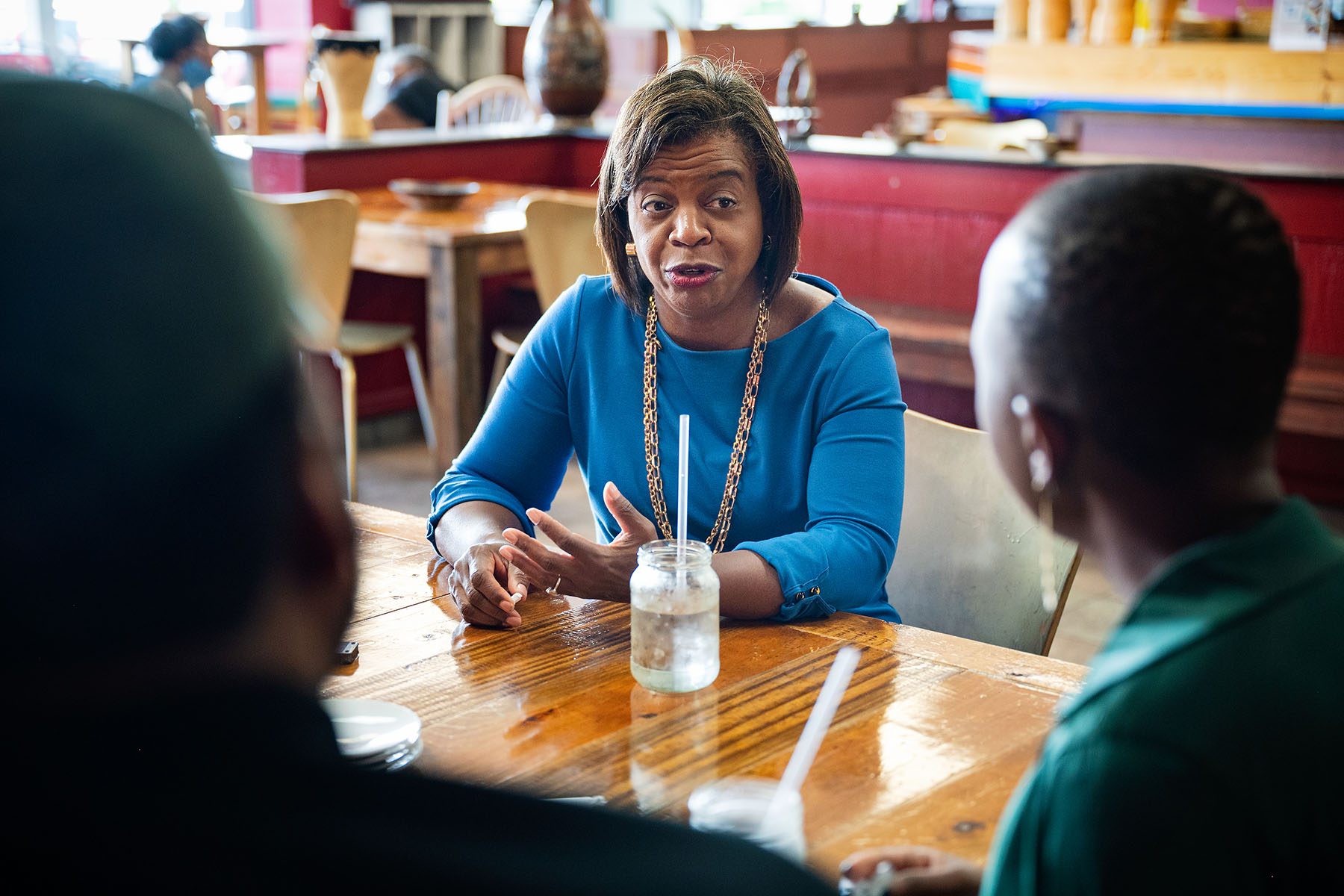Editor’s note: This article has been updated to reflect Cheri Beasley's victory in the Democratic primary.
Tuesday’s primary in North Carolina was the latest test for a slate of Black women running for Senate in this cycle’s midterm elections, with Democrat Cheri Beasley emerging as the nominee among a crowded field that includes six Black women — more than any other state. A seventh Black woman will also be running as an independent in the general election.
Beasley, the former chief justice for the North Carolina state Supreme Court, is running to replace Republican Sen. Richard Burr, who decided not to seek reelection. She won the Democratic primary with more than 80 percent of the vote.
Interviews with several organizers and academics say that Beasley’s resume and campaign reflect an underreported narrative about Black women candidates: rather than waiting on the sidelines for political opportunities, in reality many are diligently serving in other government positions, giving them valuable experience that can improve the viability of their campaigns.
“Black women have never been on the sidelines; they have been working their way up,” said Candis Smith, an associate professor of political science at Duke University. “Beasley has been a judge since she was 32 years old. So, you know, this has been a long time coming. Val Demings was a police officer, then she was chief of police; she moved her way up and now she’s a congresswoman.”
With the ascendance of Kamala Harris from the Senate to the vice presidency, there are currently no Black women serving in Congress’ upper chamber. Candidates are trying to change that. Nationally, a high of at least 20 Black women are expected to be on the ballot for Senate primaries this cycle, according to Kelly Dittmar, director of research and scholar at the Center for American Women and Politics at Rutgers University.
This includes Rep. Val Demings, who is challenging Republican incumbent Sen. Marco Rubio this year in Florida and, like Beasley, is all but assured the Democratic party nomination. In Pennsylvania, Kathy Barnette, a Republican who received little attention early on, has seen a late surge in the polls, breathing life to her campaign. If successful, she would be just the second Black woman Republican to ever serve in Congress.
In addition to Demings, Beasley, 56, has emerged as one of the most talked about Black women candidates for Senate. Early on in her career, Beasley worked as an assistant public defender in Cumberland County, North Carolina. In 1999, she was appointed to be a state district court judge, a seat she maintained through two judicial election cycles.
In 2008, Beasley was elected to the North Carolina Court of Appeals, making her the state’s first Black woman to win a statewide seat without first being appointed by a governor. She was appointed to the North Carolina Supreme Court in 2012 and appointed to be chief justice of the court in 2019, the first Black woman to hold that position. The following year, Beasley lost her election bid for a full-term role as chief justice by 401 votes.
Her previous electoral success as a judge – particularly winning the state appellate court seat – gave her an edge coming into the Democratic primary. She became the party’s presumptive nominee when her two leading competitors ended their campaigns, reinforcing the strength of her campaign.
“There does become somewhat of a checklist that kind of helps to determine how successful a person may be,” said Stefanie Brown James, co-founder and senior adviser for the Collective PAC, which works to increase Black political representation and has endorsed Beasley. “In Cheri’s case, she’s one of the rare people who has run and won statewide elections. That helps you to see that she has the experience.”
That experience includes years of building name recognition and relationships with voters, donors and people in positions of power, which are particularly important for statewide races, said Aisha Dew, the political director for the Higher Heights for America PAC, a group focused Black women political candidates that has also endorsed Beasley.
“There’s something still to be said for a seasoned candidate because the U.S. Senate is a big race,” Dew said. Beasley is “a diligent, diligent fundraiser and she’s put in the work to really make calls and to really push hard,” Dew continued.
Beasley proved to be the best fundraiser from either party in the race. By the end of April, she had raised about $9.5 million and had $3.2 million on hand; no other Democratic candidate came close.

On the Republican side, the top fundraiser was former Gov. Pat McCrory, who raised about $4.4 million and had about $1.3 million on hand. Just behind him in fundraising was Republican Rep. Ted Budd, who was endorsed by former President Donald Trump and ultimately won the Republican primary by more than 30 points based on current tallies.
Beasley’s success in the primary counters the electability questions that often surround Black women candidates. Many of them, particularly those new to politics, face difficulties getting access to early sources of funding and support from established political figures, prompting a number of Black women candidates across the political spectrum to speak out.
Black women are slowly breaking through those barriers, experts told The 19th, pointing to their growing numbers in elected office generally, but particularly congressional seats in majority-white districts.
Throughout her campaign, Beasley has avoided focusing on her racial identity when asked about the historic nature of her race. In an interview with WFAE last year, Bealsey said she is aware that Black women lack representation in the Senate, but said it is not the reason she is running.
“It’s important for me to fight for the people of North Carolina, to know that education is so important here, that health care is critical and that good jobs come to North Carolina,” she said.
On the trail, Beasley centers issues that appeal to a broad segment of voters, including health care and economic opportunities. A May survey from Meredith College found that 70 percent of people in North Carolina believe the state should join the 38 others that have expanded Medicaid. More recently, Beasley has criticized the Senate for not codifying the landmark abortion ruling Roe v. Wade as the country awaits a consequential Supreme Court decision on its future.
When it comes to discussing policy issues that affect historically marginalized gender and racial groups, women of color candidates often face added pressure to tread carefully, for fear that a misstep could derail their campaigns. That tension is gradually lifting, experts say, but is more apparent in battleground states like North Carolina, which has been considered a swing state since at least 2008, but it leans Republican.
Both of North Carolina’s current senators are Republicans, and Trump won the state by 1.3 points in 2020. Democrats have seen some statewide success, though. Since 1998, the majority of the state’s governors have been Democrats, but the president’s party typically loses seats in a midterm year.
Despite this uphill battle for Beasley, the state’s changing racial makeup could benefit her in November. Voters of color are politically diverse, but they tend to favor Democrats. From 2000 to 2018, North Carolina saw a six percentage point decrease in the share of White eligible voters, according to a report from the Pew Research Center. Census data from 2020 indicates that the Hispanic and Asian populations grew the most. The state has also seen an influx of Black residents in heavily democratic cities like Charlotte.
Rising racial diversity does not guarantee more electoral victories for Democrats, but many look to the party’s success flipping two Republican Senate seats in Georgia last year as a testament to the power of shifting demographics and dedicated grassroots organizing. Even in a difficult midterm year for Democrats, that victory offers hope to Democratic advocacy groups that support Beasley’s candidacy.
“The South, generally speaking, is seeing migration, especially of well-educated Black people from other parts of the country coming here to Charlotte, to Raleigh, to Durham, to Greensboro. That is something that people should be paying more attention to and is making a big difference politically,” Smith said.







